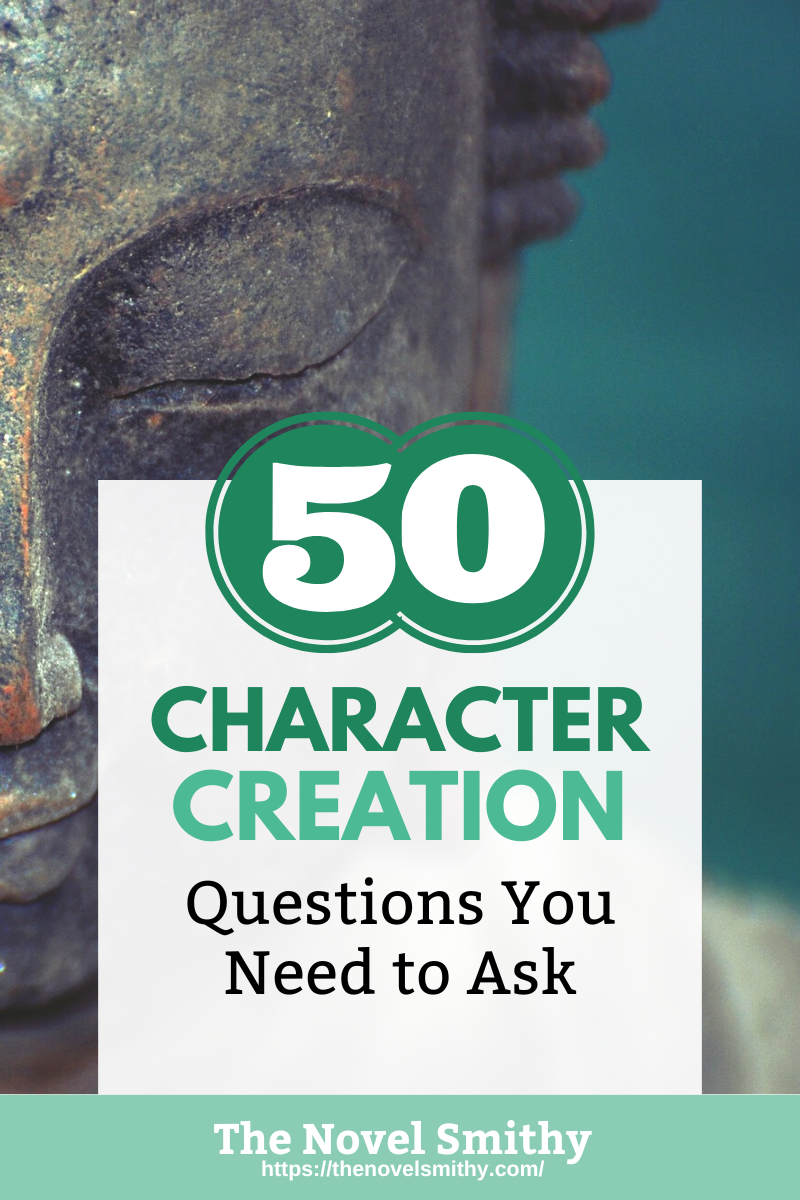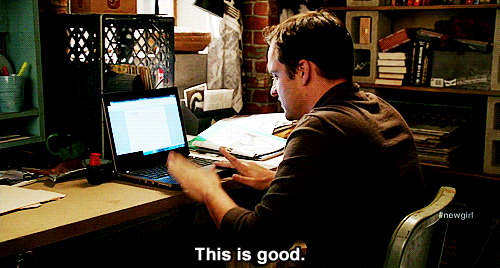Character Creation Questionnaire: 50 Questions You Should Be Asking
This is one of the best parts of writing a novel!
Whether you’re writing an action-packed thriller or an introspective character study, character creation is always a blast. There’s something about that human element that is endlessly engaging, meaning it’s no wonder that character questionnaires are so fun to work through.
But, what makes for a good character questionnaire? Many focus on only surface concerns like appearance and habits, but there’s more to your cast than just their personalities. So, in this article, let’s explore fifty character creation questions—as well as how you can use them to write an awesome cast!
What Is a Character Questionnaire?
Contents
 If you’re new to the world of character questionnaires, this is a great tool to add to your writing arsenal!
If you’re new to the world of character questionnaires, this is a great tool to add to your writing arsenal!
Character questionnaires are series of targeted character development questions, designed to help you better understand things like your character’s personality, identity, habits, and fears. This gets you thinking about your cast in new ways, and can make it much easier to write realistic, engaging stories.
Better yet, these questionnaires come in many shapes and sizes.
Most character questionnaires range from fifty to two hundred questions, depending on their focus. There are also a variety of types of questionnaires, from more generic ones, to ones themed around specific genres, character types, or topics.
The Problem with Most Character Questionnaires
Unfortunately, “variety” is one of the big problems with most character questionnaires…
Many of the questionnaires you find online focus on only generic or situational questions, such as your character’s favorite foods, most embarrassing moment, or cleaning habits. After a while, it can feel like you’re answering security questions, rather than developing a deeper understanding of your cast.
Don’t get me wrong—these questions aren’t bad by any means.
The problem is when they’re the only questions you’re asking.
The key to a solid character questionnaire is blending both surface questions, as well as deeper ones that reveal important aspects of your character. How would they describe themselves? How do they change throughout your story? How do their actions affect the people around them?

This is especially important for characters like your protagonist. Because your protagonist is the primary catalyst of your novel, it’s vital that you understand their place in your story, as well as how they’ll move, think, and behave.
Luckily, questionnaires are still useful, so long as the one you’re using is solid!
To help you out, I’ve created a short character questionnaire that strikes a healthy balance between personality and purpose. It includes fifty questions, organized around five topics:
- Personality, Appearance, and Behavior
- Identity and Backstory
- Motivations and Goals
- Their Deepest Beliefs
- Their Character Arc
NOTE: This questionnaire should take you around one hour to complete.
If you want an easy way to save these questions for later, make sure to download my free workbook, 50 Questions to Ask Your Protagonist. It includes all the questions from this article, and is both fillable and print-friendly, depending on your preference!
50 Character Creation Questions You Need to Ask
A Quick Introduction:
Before we can dig deep into your character’s psyche, we need to start with the basics.
Though we won’t stop here, these introductory questions are still an important part of understanding things like your character’s personality, fears, and habits. This is your chance to get to know your character as a person, much like you would get to know a new friend.
As you go through these questions, imagine your character in their normal life:
- What is your character’s name? Where does it come from?
- What is their most prominent feature?
- How do they move? What are their mannerisms and quirks?
- How do they treat the people they hate/like?
- Where are they happiest? Where are they unhappy?
- In their mind, what is the secret to a good life?
- What is their greatest fear?
- Have they ever lied to someone they cared about, and why?
- What do they dream about at night?
- What do they want to do, change, or see before they die?
To explore these questions further, here are two resources I recommend:
Exploring Their Identity:
With the basics taken care of, it’s time to ask some harder questions, specifically about your character’s identity.
This section is your chance to think about their view of themselves and their world, and learn more about how that view shapes their identity. A lot goes into this, but one of the biggest influences will be their backstory—so this should be a fun series of questions!
As you go through these questions, consider the things your character is afraid to say:
- Who are they? How would they define themselves?
- What is your character’s best quality?
- What do they hate about themselves?
- What do they want others to know about them?
- What are they afraid of others finding out?
- What is the most important event of their life so far?
- How has this event shaped their life?
- Who is the most important person in their life, and why?
- What does that person think of them?
- Where do they fit in their society? Are they happy there?
To explore these questions further, here are two resources I recommend:
- 4 Ways to Discover Your Protagonist’s Identity
- Character Backstory: Three Steps for a More Balanced Approach
Uncovering Their Goals:
Next, we need to know what gets your character out of bed each morning.
This will be their story goal, which is the driving force pushing them to take action, learn, and adapt throughout your novel. The more focused this goal is, the stronger it will be.
For instance, “become more popular” isn’t the best story goal—it’s really just a general motivation. In contrast, “oust Jennifer and take her place as prom queen” is nice and specific, while still achieving the same result!
As you go through these questions, focus on what motivates your character:
- What is their purpose or mission when your story starts?
- If they could change one thing, what would it be?
- What is their primary motivation throughout your story?
- How does this motivation take shape as a specific goal?
- Why do they pursue this goal, versus some other path?
- How does their identity shape their goal?
- What are the consequences if they fail to meet their goal?
- Why do these consequences matter to them personally?
- How far would they go to avoid these consequences?
- Would failure affect only them, or those around them too?
To explore these questions further, here are two resources I recommend:
Questioning Their Beliefs:
Alongside goals and identity, your characters will also have some harmful belief, as well as a lesson they’ll need to learn. These take shape as their inner struggle and truth, respectively.
Of course, not all characters need an inner struggle. Every member of your cast will have flaws, but only dynamic characters like your protagonist need a specific harmful belief. Because of this, you may be able to skip these questions for some characters—I’ll trust your judgement!
As you go through these questions, think about your character’s deepest beliefs:
- What internal obstacle will they face throughout their story?
- What harmful belief do they hold?
- How does this belief affect their behavior and actions?
- How will this stop them from achieving their story goal?
- What lesson do they need to learn to overcome this belief?
- How will this lesson change their life and behavior?
- Why will they resist this lesson?
- What event could force them to embrace their truth?
- How can they prove they’ve accepted their truth?
- How will this change their relationships and community?
To explore these questions further, here are two resources I recommend:
- Dynamic vs. Round Characters: Who Needs a Character Arc?
- Inner Struggle: The Foundation of Compelling Character Arcs
Mapping Their Arc:
Finally, the best characters evolve and change through what is called a character arc. This is a useful framework for creating believable transformations in our characters, and is a key part of writing compelling stories.
As with the previous section, this won’t apply to all characters—but it’s still worth thinking about for the most important members of your cast.
As you go through these questions, look for the ways your characters evolve:
- Where are they mentally and physically early in your novel?
- How does this compare to the end of your novel?
- Does your character change for the better?
- Do they become a worse version of themselves?
- Why do they get involved with your plot in the first place?
- What decision sparks their involvement?
- What turning points do they experience during your story?
- What is their darkest moment? What is their highest?
- How will their arc shape and influence your novel’s plot?
- What do they add to your story that no one else could?
To explore these questions further, here are two resources I recommend:
How to Build Your Character Profile
Once you’ve completed this character questionnaire, you should have a lot of ideas about who your character is, how they’ll grow and evolve, and how they’ll shape your novel’s plot.
Of course, these ideas can be hard to put into action.

You’ll be juggling a lot while writing your novel, so keeping track of all the details of your character’s life can be difficult. So, to make this character questionnaire even more useful, here’s a quick character profile template you can use to organize your thoughts:
- Your Character’s Name
- Their Personality, Appearance, and Identity
- Their Inner Struggle
- Their Truth
- The Most Important Event of Their Past
- How They Change Throughout Your Novel
- Their Story Goal
- The Consequences They’ll Face
Excited about the template?
Then don’t forget to download my free character questionnaire, 50 Questions to Ask Your Protagonist. It contains all the questions from this article in an easy-to-use workbook, and even includes this character profile template as a fillable section at the end.
If you’re ready to put this character questionnaire into action, this is a great way to do so!


Leave a Reply